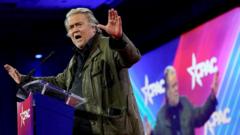With the recent election of Pope Leo XIV, born Robert Francis Prevost in Chicago, the intersection of faith and politics in America has come into heightened focus. While President Trump praised the Pope’s election as an honor for the nation, proponents of the MAGA movement are increasingly concerned that the new leader of the Catholic Church does not align with their "America First" ideology.
Pope Leo XIV has raised eyebrows with his vocal concern for the poor and immigrants, leaning towards more liberal perspectives, reminiscent of his predecessor, Pope Francis. His social media activities suggest a critique of Trump’s policies, particularly regarding immigration, which has some conservative Catholics and Trump supporters worried about potential friction. Steve Bannon, Trump’s former chief strategist, voiced his astonishment regarding the Pope's previous public statements, suggesting that tensions between the Vatican and the Trump administration are imminent.
John Prevost, Leo's brother, shared insights, believing that the Pope will express discontent with Trump’s stance on immigration without hesitation. Surveys indicate that while a significant portion of American Catholics align with Republican values, many also support liberal positions on various social issues. With about 20% of Americans identifying as Catholic—and a substantial number favoring Pope Francis—demographic trends suggest that Leo's alignment could affect expectations within the church.
In Chicago, Catholics are hoping that Pope Leo XIV will continue the progressive agenda set forth by Pope Francis. Rick Stevens, a Catholic deacon from New Jersey, emphasized the desire for continuity in leadership. The U.S. Conference of Catholic Bishops echoed this sentiment, celebrating Leo’s election while underscoring his responsibilities as a spiritual leader for all Catholics, regardless of political affiliations.
Prominent voices within MAGA have characterized the new Pope’s election as a response to Trump’s policies, highlighting concerns over his purported embrace by more progressive factions. Critics on conservative platforms have labeled Leo as "anti-Trump" and "pro-open Borders," inferring that his papacy may stir division among American Catholics.
There remains an uncertainty surrounding Pope Leo XIV's stance on LGBTQ rights and abortion, with the potential for varying interpretations within conservative circles. Overall, while the new Pope’s approach to leadership is yet to unfold, the implications of his election will likely reverberate through American Catholicism and its relationship with the current administration, as conversations about faith and politics continue to evolve.






















